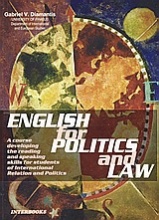English for Politics and Law
A Course Developing the Reading and Speaking Skills for Students of International Relations and Politics
It is commonly known that political argument often boils down to a struggle over the legitimate meaning of terms. The problem is that words such as -democracy-, -freedom- and -justice- have different meanings to different people, so that the concepts themselves come to seem problematic. A way out of this dilemma was found by W. B. Gallic (1955-6), who suggested that in the case of concepts such as the ones cited above, controversy runs so deep that no neutral or settled definition can ever be developed. It is also known that the language used by students of politics is largely the same as that used by practitioners of politics, and particularly by professional politicians. As the latter are primarily interested in political advocacy rather than political understanding, they have a strong incentive to use language to manipulate and sometimes confuse. This, in turn, forces students of politics to be especially careful in their own use of language. They must define terms clearly and refine concepts with precision in order to safeguard them from the misinterpretations often current in everyday political debate.
- ISBN978-960-390-114-3
- Ημ/νια Έκδοσης2002
- Σελίδες447
- ΔέσιμοΜαλακό εξώφυλλο
- Διαθέσιμες Γλώσσες
- Κατηγορίες Βιβλίου
- Θεματολογίες Βιβλίου
- Συγγραφέας
- Εκδότης




